May 17, 2025 | 11:48 GMT +7
May 17, 2025 | 11:48 GMT +7
Hotline: 0913.378.918
May 17, 2025 | 11:48 GMT +7
Hotline: 0913.378.918
Millions of people in the Mekong Delta region are living during the peak days of saltwater intrusion in the 2023–2024 dry season.
According to a survey by the Ministry of Agriculture and Rural Development, the whole region has about 30,000 households affected by domestic water, mainly in areas served by centralized water factories. In addition, about 10,000 small and scattered households are also lacking domestic water.
Drought and saltwater intrusion have upset the daily lives of people in the Nine Dragons region. Reporters from Vietnam Agriculture Newspaper went to rural regions, especially coastal localities, to record real-life stories about how people and local governments cope with drought and salinity.
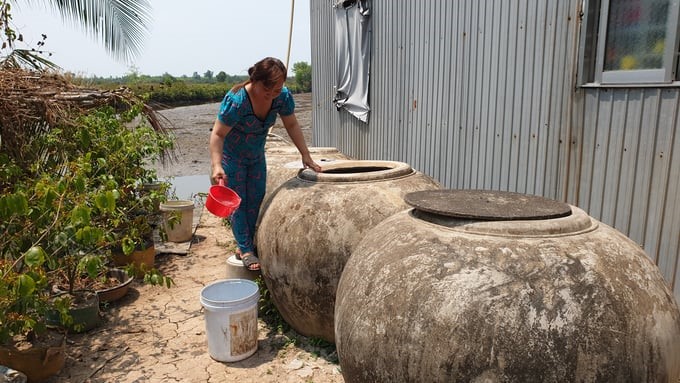
Ca Mau has about 12,000 households lacking clean domestic water. Photo: Trong Linh.
Speaking to reporters, Mr. Phan Hoang Vu, Director of the Ca Mau Department of Agriculture and Rural Development, gave an alarming number: About 12,000 households are at risk of lacking domestic water at the end of March and in April due to drought. And in fact, some households had to buy water from rowboats and ships at prices up to more than VND 40,000/m3.
According to the Department Director, because there is no additional fresh water source, Ca Mau residents' current domestic water is mainly stored in the months of the rainy season or is groundwater exploited from the ground. The places lacking water are mostly due to not having a networked water system or not being able to drill for groundwater.
As noted by reporters from Vietnam Agriculture Newspaper, Bien Bach commune, Thoi Binh district, has more than 1,800 households, but more than 450 households lack domestic water.
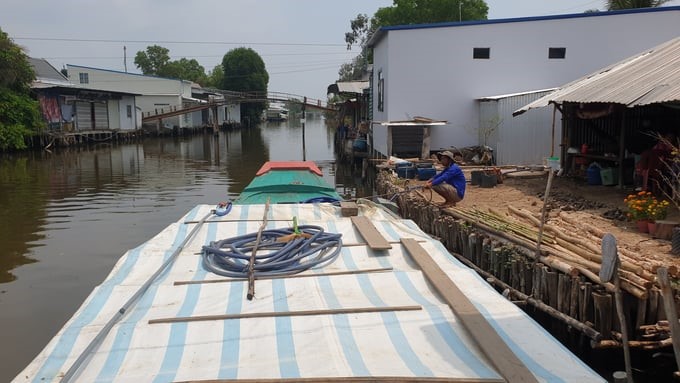
Some households are forced to buy water from rowboats and ships at prices up to VND 40,000–50,000/m3. Photo: Trong Linh.
A typical case is Mr. Le Tuan Anh's family (living in Bien Bach commune), who have had to buy water from rowboats for about 3 months. Despite sparing use, it still costs nearly VND 500,000 in water each month. Meanwhile, the family's main income depends on Mr. Tuan's salary (VND 3 million/month). Electricity and water bills account for nearly half of total income.
And in U Minh district, Ca Mau province, through the sharing of Mr. Nguyen Hong Duy, Party Committee Secretary of Khanh Thuan commune, the locality has 15 hamlets with more than 2,900 households. People’s domestic water comes mainly from drilled wells. However, not every location can drill water wells. Many canals are contaminated with saltwater, so during the rainy season, people have to use jars to store rainwater. Compared to usage needs, the amount of storage is nothing.
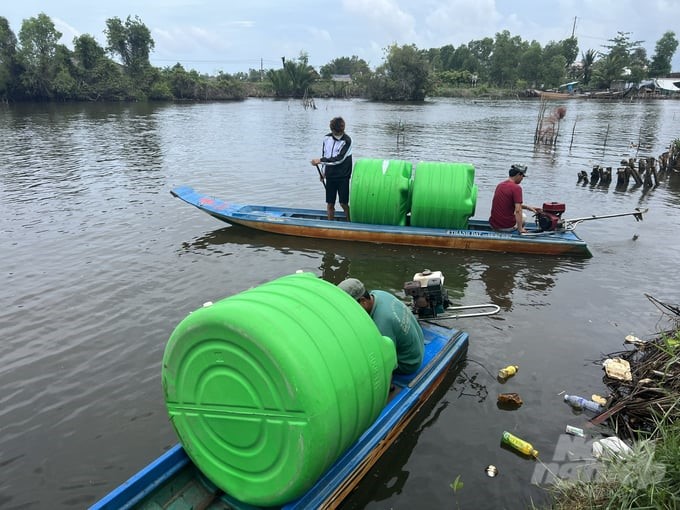
People in Khanh Thuan commune buy plastic tanks to store rainwater. Photo: Trong Linh.
As of now, the total number of households using clean water in the commune has only reached 1,450, accounting for 50%. Of these, the number of households using water from the centralized water factory is just over 590, equivalent to about 20%.
Recently, Khanh Thuan commune has invested in seven clean domestic water treatment and supply systems for six hamlets, including hamlets 1, 12, 17, 18, 19, and 20. However, to date, many centralized clean water supply systems have been damaged without funding to repair them.
The remaining hamlets do not have a centralized water treatment system; the water source people use is mainly drilled-well water. In places where wells cannot be drilled, people face many difficulties. Typically, in hamlet 18, Khanh Thuan commune, through inspecting 10 adjacent households without water, people had to buy water from households or water supply systems from other hamlets.
Sharing about the source of daily drinking water, Mr. Phan Hoang Anh (hamlet 18, Khanh Thuan commune) said: “For a long time, the family had to buy domestic water from households in hamlet 25 at prices of VND 4,000–5,000/60l. Last day, my husband and I were looking forward to receiving water tanks from a volunteer group.”
According to the Ca Mau Department of Agriculture and Rural Development, in the province, there are currently about 3,700 households lacking fresh domestic water; people have to buy water at high prices for use.
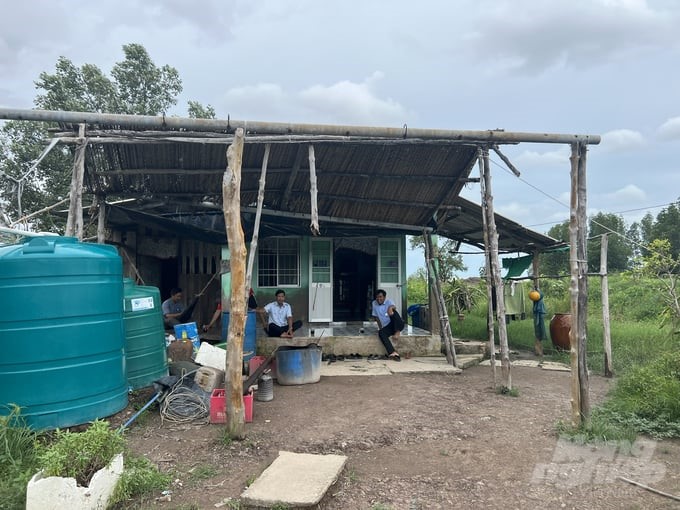
People buy large-capacity tanks to store domestic water. Photo: Trong Linh.
The agricultural sector of Ca Mau province recommends that people use water sparingly and proactively use available tools to store domestic water in case the groundwater level drops, making it difficult to get water. The functional sector is also reviewing households lacking water to find support solutions such as providing water tanks, upgrading and expanding water supply systems, etc.
Localities are urgently implementing many solutions to supply fresh domestic water for people in drought-salinity areas. The agricultural sector of Ca Mau province proposed to allocate VND 39 billion in budget to newly install pipes, provide water tanks to disadvantaged households, and increase the capacity of water supply stations to serve people with domestic water. From this week, the locality will mobilize the armed force, union members, and people to jointly participate in installing pipes and transporting water to people in disadvantaged areas.
In addition to the risk of fresh water shortages, Ca Mau people are currently facing increasingly serious subsidence and landslides due to the increasingly severe drought in the freshwater region, and many roads are divided.
Since the beginning of February, many canals have almost dried up. There are hundreds of positions with subsidence and landslides, causing tens of billions of dongs in damage. A typical example is the rural traffic road along the bank of the Cay Sop canal (Trum Thuat hamlet, Khanh Hai commune, Tran Van Thoi district, Ca Mau province) with a hundred-meter-long subsidence. The most subsided place was more than 2 meters from the foundation, causing the road to be deformed and completely damaged. According to local people, the road was newly completed about a year ago.
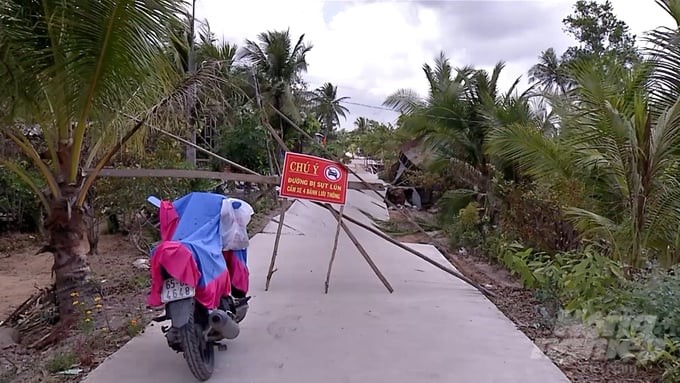
The rural traffic road that was newly completed nearly a year ago was damaged. Photo: Trong Linh.
According to the local government, most roads are built near rivers and canals. During the dry season and drought, rapid evaporation combined with pumping water for production has caused most of the canals and ditches in the freshwater region to dry up. Meanwhile, the deep canal bottom altitude and the large difference between road surface and water caused a loss of counterpressure, causing subsidence.
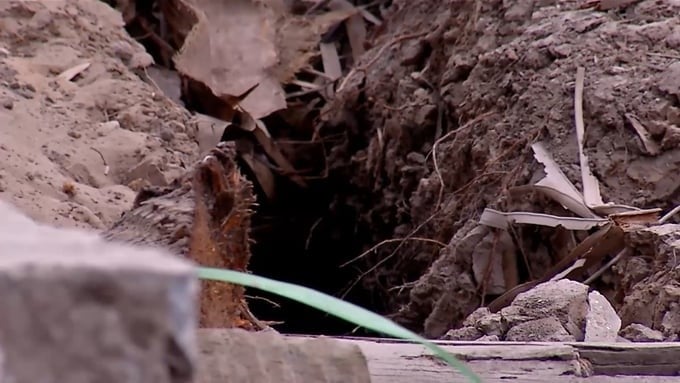
There are some locations with subsidence nearly 2 meters deep. Photo: Trong Linh.
To reduce subsidence, the government of Khanh Hai commune must mobilize people to cut down trees on both banks to reduce pressure on the canals. Drought causes not only subsidence and landslides on roads along the canal banks to become complicated, but also the dry and cracked soil underneath the canal.
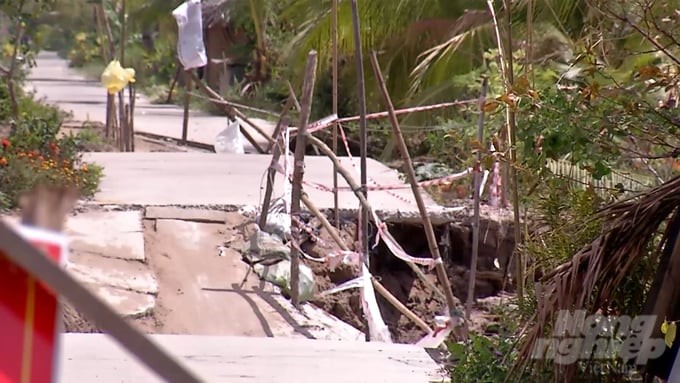
Severe subsidence and landslides in Ca Mau. Photo: Trong Linh.
In Tran Van Thoi district, tens of thousands of hectares of winter-spring rice in the harvesting stage are facing difficulty in transportation. According to people, subsidence has damaged many roads, so people's rice harvest is now facing many difficulties. Most motorized vehicles used to harvest and transport rice are facing difficulties. Motorcycles have now become the main means of transporting rice after harvest. Therefore, people have to pay an additional cost for this transportation.
Mr. Nguyen Minh Kha, Khanh Hai commune, Tran Van Thoi district, Ca Mau province, said that a vehicle can carry 3 bags/time, and 10 people can carry 1 ton. The shipping fee is VND 10,000/bag. From the river to here, transporting also costs VND 7,000/bag.
"Rice was initially priced at VND 8,000/kg but has now dropped to more than VND 6,000/kg due to deducting transportation costs caused by damaged roads," said Ms. Dinh Thi Xuan in Khanh Hai commune.
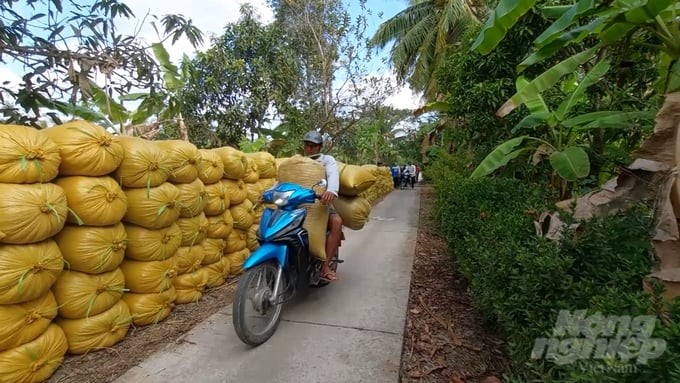
Faced with the drought, people's lives are difficult. Photo: Trong Linh.
In the winter-spring rice crop of 2023–2024, the entire Tran Van Thoi district sowed approximately 29,000 ha. Up to this point, more than 70% of the rice area has been harvested. Supporting and creating conditions for people to participate in harvesting rice is very necessary, helping to reduce costs caused by the effects of the current drought.
Translated by Huyen Vu Thu
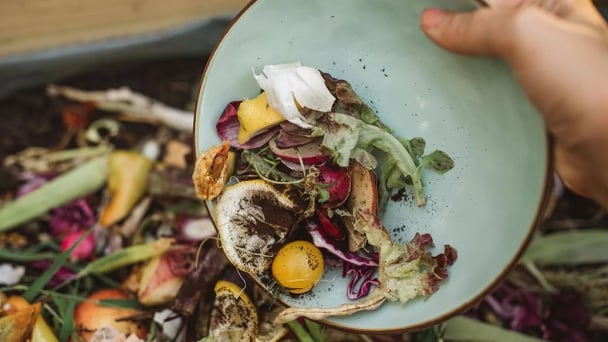
(VAN) Food waste has become a serious issue in modern society, especially in rapidly urbanizing and developing cities like Hanoi.
![Multi-channel, multi-directional Vietnamese agricultural markets: [7] Deep processing makes global reach easy](https://t.ex-cdn.com/nongnghiepmoitruong.vn/608w/files/huytd/2025/05/16/2946-che-bien-sau-chia-khoa-vang-nang-tam-nong-san-viet-tren-ban-do-the-gioi-080603_110-093858.jpg)
(VAN) The application of deep processing technology is helping Vietnamese agricultural products enhance their value, create competitive advantages, and open doors to conquer global consumers.
![Multi-channel, multi-directional Vietnamese agricultural markets: [6] Agri products go online](https://t.ex-cdn.com/nongnghiepmoitruong.vn/608w/files/content/2024/12/10/1-113313_954.jpg)
(VAN) Bringing agri products onto e-commerce platforms is an effective way to build a brand that many businesses, cooperatives, and agricultural production households are doing.

(VAN) Veterinary training should focus on quality, not just quantity. Veterinarians also need more options to pursue specialized training.

(VAN) The veterinary industry needs to be viewed objectively and further invested in to properly demonstrate its role and importance in the new context.

(VAN) The number of veterinarians graduating each year is not enough to meet actual needs, hence a difficult problem for the growing livestock industry.

(VAN) The strategic partnership between Cambodia, the Philippines, Vietnam, and CGIAR ensures that innovative solutions effectively address national priorities for food system development.